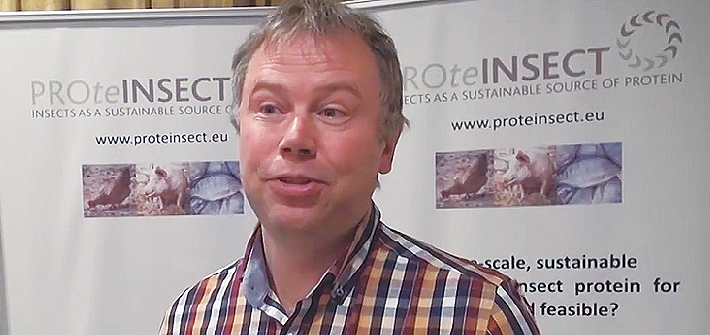There are no significant performance differences between feeding pigs on insect protein as opposed to using a more conventional soya-based diet. There’s also every chance that the legislation needed to allow pig producers to switch to insect-based rations will be in place and approved within the next five years.
Colin Ley considers the latest views of the European scientific community on the use of insect protein
These are the two headline conclusions to emerge from more than three years of commercial trials, scientific analysis, consumer surveys and political negotiations carried out by the EC-funded PROteINSECT project.
Established in 2013 to draw together a growing body of work and opinion on the potential for turning food and animal waste into a new livestock feed source, using the common house fly to do the conversion, the PROteINSECT project held its final conference session in Brussels earlier this year, signalling that the foundation work is now complete.
While legislation, production and user acceptance barriers remain to be negotiated, the message from PROteINSECT’s leaders is that insect protein has been shown to be a perfectly viable option as a major contributor to helping meet the world’s growing protein needs.
Feeding trials with pigs, chicken and fish have also shown that the product works at a commercial level.
“Overall, no significant differences were observed in piglet performance, indicating that exchanging crude insect meal or extracted insect proteins for a similar amount of soya meal and oil, does not lead to reduced animal performance,” said feed trials analyst Dr Geert Bruggeman (pictured above) of the Belgian-based business, Nutrition Sciences.
Comparing the results of piglet performance across three diets; a control, insect meal and insect extract, Dr Bruggeman reported finding no differences in either feed intake levels, average daily gain or feed conversion ratio.
“In addition to these live animal checks we also dissected some finished carcases and found that good bacteria levels were increased and back bacteria levels were reduced,” he said.
“Similar findings have shown up in Chinese trials, which delivered some improved health aspects. This is perfectly logical, of course, given that insects are part of the natural diet of animals and that what we’re doing is merely imitating nature.”
However, while commenting that he saw no technical, health or performance reasons why insect protein should not become part of the world’s future animal feed resources, Dr Bruggeman identified two significant ‘bottlenecks’ that he warned would need to be overcome in order for the industry to move forward.
“One bottleneck concerns the work involved in achieving the necessary production scale to make insect protein available at a worthwhile commercial level,” he said. “This is also linked to the other bottleneck, which concerns the need to create a legislative structure to govern the commercial use of insect protein in animal feed.
“Until we have such legislation in place, we won’t see investments being made to create the degree of production scale needed to take insect protein usage to the next stage. It’s a classic chicken-and-egg scenario.”
He added, however, that progress is being made towards securing utilisation approval for insect proteins.
“It’s not going to happen tomorrow, but I do see some light at the end of the tunnel,” he added, commenting after delivering his feed trials evidence at PROteINSECT’s final conference in Brussels, where he also gave delegates a bit of personal insight on how European feed manufacturers may be thinking.
“I recently attended the global feed industry congress in Turkey (April 2016), and whenever I mentioned insect protein in conversation with feed company delegates the response I got amounted to just the three words ‘we are ready’,” said Dr Bruggeman.
* * * * *
Insects are already a natural diet component
Insects are already a natural component of the diet of pigs, poultry and fish, a fact that makes the investigation of their potential inclusion in future feed rations a perfectly logical step, writes Colin Ley.
That was the claim made by Fera Science’s Adrian Charlton when he addressed the recent PROteINSECT conference in Brussels.
“Insects are an innovative new source of feed and, according to current studies, offer a viable option for farmers to use in livestock diets,” he said.
While accepting that a lot of work still remained to be done, especially in managing the animal feed safety risks, Dr Charlton pointed out that, as a pure protein source, insect protein was about 86 to 89% digestible, which was significantly higher than most vegetable based proteins.
“There’s also the potential for high value by-products such as fats and oils,” he said. “When combined with potential production efficiencies, this makes insect feed an attractive option for the future of animal nutrition.
“While soya yields about 0.9t/ha of protein, for example, insects are capable of protein yields of 150t/ha. That’s a 200-fold reduction in land use.
“Obviously we need to understand the methods of production, the costs involved and the safety elements, but the early data suggests this is a viable option for the future.”
Fera Science, based near York, is a coordinating partner in the PROteINSECT project.




